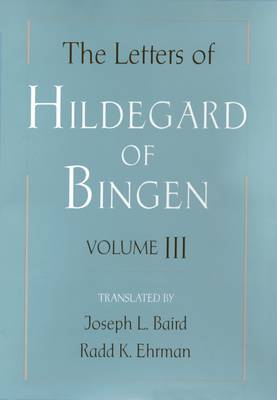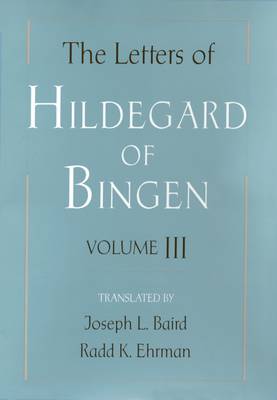
- Afhalen na 1 uur in een winkel met voorraad
- Gratis thuislevering in België vanaf € 30
- Ruim aanbod met 7 miljoen producten
- Afhalen na 1 uur in een winkel met voorraad
- Gratis thuislevering in België vanaf € 30
- Ruim aanbod met 7 miljoen producten
Zoeken
€ 245,95
+ 491 punten
Uitvoering
Omschrijving
This is the third and final volume of the complete annotated correspondence of the extraordinary nun, Hildegard of Bingen (1098-1179). One of the most remarkable women of her day, Hildegard was, for more than 30 years, an unflinching advisor and correspondent of all levels of church and society, from popes and kings to ordinary lay persons, from Jerusalem to England. This present volume (letters 218-390) is noteworthy for its large collection of letters to a non-ecclesiastical audience, and because it contains letters not just to such high-ranking notables as Frederick Barbarossa, King Henry II of England, or Eleanor or Acquitaine, but also to common, ordinary individuals of no importance whatsoever, save that they received a letter from Hildegard of Bingen. Addressing matters as diverse as the "humors" and their relation to health and salvation, the fate of departed souls, the frequency and horror of homicide in her age, a means of exorcising malignant spirits, an effective kind of incantation to alleviate nightmares, the proper attitude and response to the fact of excommunication, and male infidelity in marriage, Hildegard provides a unique view of the twelfth century world. Here also are found compositions in epistolary style that are actually sermons, mediations, prayers, or treatises on a wide range of theological topics, such as prophecy, celebration of the Mass, the Lord's Prayer, the creation, and the fall of Adam. Like previous volumes, the translation follows the most recent definitive Latin text, in which the letters are organized according to the rank and station of Hildegard's correspondents.
Specificaties
Betrokkenen
- Auteur(s):
- Vertaler(s):
- Uitgeverij:
Inhoud
- Aantal bladzijden:
- 240
- Taal:
- Engels
- Reeks:
Eigenschappen
- Productcode (EAN):
- 9780195168372
- Verschijningsdatum:
- 18/03/2004
- Uitvoering:
- Hardcover
- Formaat:
- Genaaid
- Afmetingen:
- 158 mm x 246 mm
- Gewicht:
- 512 g

Alleen bij Standaard Boekhandel
+ 491 punten op je klantenkaart van Standaard Boekhandel
Beoordelingen
We publiceren alleen reviews die voldoen aan de voorwaarden voor reviews. Bekijk onze voorwaarden voor reviews.







